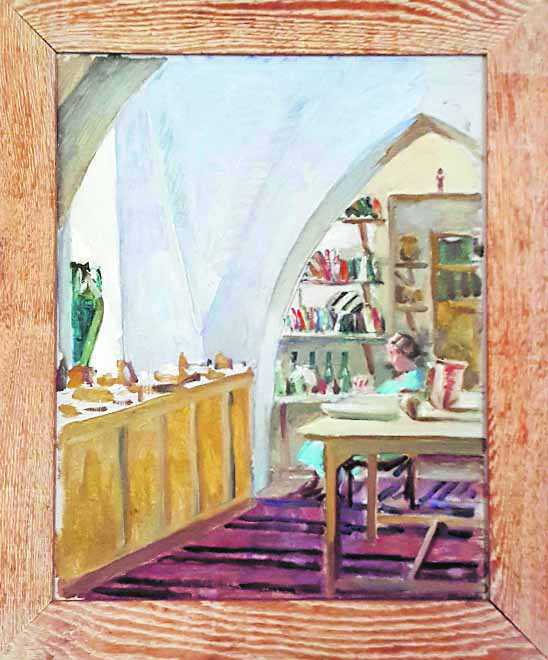
A portrait of Agatha Christie
Harish Khare
This comes from Devon (England). A long-planned family reunion brought me to this English county that sits at the edge of the English Channel. I have never been much enamoured of London and was not at all regretful about having to give the great metropolitan city a complete pass. Instead, from the airport, we drove straight to the seaside town of Exmouth.
A couple of years ago, I had casually mentioned to my sister-in-law that one of my unfulfilled desires was to do the famous Jurassic Walk, on the southern coast of England. And, she mentioned that her husband’s (an Englishman) family home was right on the coastal path. “Our backdoor opens on to the path,” she had pronounced invitingly. I took the bait. Hence, the trip.
And, what a delightful little town it is, this place called Exmouth. Sitting on the mouth of the Exe river. Only 30,000 people and miles and miles of extremely well-maintained walk-paths, no cars, not even bicycles (most of the time), climbs and descents, breathtaking views of the ocean, freshest breeze, unpolluted air, red rocks, cattle grazing, green meadows. The hills are so utterly, utterly picturesque. It appears as if a landscape artist has painted the hills. A perfect rural ambience. Signs on the winding lanes warn of stags, cows, horse-riders. A total place for anyone who enjoys walking. That is Devon.
“What do they know of England who do not know Devon?” This is the opening line of “Devon” in the famous 41-volume series on The King’s England by Arthur Meer. Devon is generally described as “English to the core.” The history of its towns goes back, centuries and centuries, to the Roman days.
The sea dominates the life, the topography and the economy. The sea fascinates, each wave makes its own music, each receding wave leaves behind a new pattern on the sand. There is sunlight till about nine in the evening. During the day, the sun shimmers on the water, providing an enchanting spectacle from each high point. In the night, the watery surface becomes like a moonlit runway.
As could be guessed, tourism is the mainstay of the Devon economy. That means a conflict of some kind. A “battle of wills” between “developers” and “preservers”, as one long-time citizen put it. Exmouth is witnessing a clash between East Devon District Council, the local district governing body, and an environment-friendly group, the Save Exmouth Seafront. The “developers” bring in big money, but they also want to take liberties with the town’s character. The locals wants to savour the old ambience.
For example, walking around, I noticed a sign on the gate of a grand old building. It had been put up by “Exmouth Society” proclaiming how this property, called Lower Haldson Farm, sitting on 44.5 hectares of land, was donated to the National Trust in1995 and how the owners were encouraged by some distinguished citizens to resist “pressures to sell the land for development”. The sign proclaimed, with satisfaction, that now “the land will be held by the National Trust to preserve the open views across the Exe Estuary in perpetuity. The farm is also an important area for wintering migratory birds.” Hundreds of such battles are going across the entire Devon county.
There is, also, a lively and insistent involvement of the local citizens in local affairs. I noticed that the Exmouth Journal, a local weekly publication, itself did not take editorial positions, but preferred to provide a forum for the community members to raise their voice and their concerns. The majority of the locals are elderly people. “Elderly are being bullied,” complains a citizen in the latest issue of the Exmouth Journal. The complaint is against the local authority’s decision to make people pay compulsorily a charge for the “Home Safeguard Alarm System.” Many citizens believe this service should be completely free of cost, as has been the arrangement all these years.
These quasi-conflict situations are inevitable in any rural setting. But walking around the region, one gets a feeling of a close working relationship, based on mutual trust and respect between the citizens and the authorities. It would appear that every single inch of the Jurassic Walk is well looked after, almost manicured, inviting, invoking responsible behaviour from the visiting tourist.
There is a sense of tremendous pride in preserving the place and a realisation that the town’s health ought to be everyone’s concern. The two accompanying photos of the local signs clearly indicate that a good citizen is also a responsible citizen.
In Exmouth, it was suggested that we must take a trip to Dartmouth, about 40 miles away. And, in Dartmouth, you are told that Agatha Christie made her holiday home in that part of the world. There is a ferry to Greenway, the Agatha Christie estate.
Having read almost every single one of Christie’s novels, I found it impossible to resist that ferry ride to Greenway. Once on that island, one balks at the steep admission price of £11.5. Felt like a virtual robbery. Yet, one paid. And, it was worth it. One realises that preserving the place and keeping the interest alive costs money — besides commitment and dedication from the goodly-sized staff. The house silently tells the story of the formidable personality of a very formidable writer who dipped into her well of creativity to produce more than 40 crime fiction books, which continue to fascinate and delight generation after generation. Christie provides a perfect peep into the morals and manners of the English countryside.
What I found very interesting was that on her working desk was a collection of books about eastern religions. The titles included the Panchatantra, System of Vedanta, Text of Confucianism, Religious System of India — The Upanishads.
The Greenway is maintained by the National Trust. An efficient and modern, yet sensitive, arrangement to preserve a historic place. The whole place bespeaks an attitude, a sense of history, and a delicate kind of aesthetics. An aura of tastefulness was overhanging the place.
And, of course, the visit would not have been complete without a scone (and jam), sinfully rich clotted cream, and tea or coffee at the cafeteria.
A very agreeable distraction from the otherwise serious business of walking and more walking.
While at Exmouth, I decided to buy a pair of walking shoes. I was told that perhaps the best place to buy walking shoes would be Exeter, a town down a few stops on the local train. It is a fairly big town, full of rather fancy shopping places. I was told to find my way to a store named “Sweat Shop.” It was a ten minutes’ walk from the Exeter Central Station.
I explained to the sales lady my requirement of a pair of sturdy walking shoes. Politely and patiently, she heard me out and then gently told me that the store specialised in running shoes only. She volunteered to guide me to another store in town, which, as you could guess, specialised in walking shoes. Helpfully, she drew a map to the walking shoes place.
I found this experience remarkably pleasant. The saleswoman made absolutely no effort whatsoever to hassle me into buying shoes from her store. Instead, she guided me to another shop. A very ethical, and, perhaps, very English attitude. Decidedly un-Indian.
The ritual of “English Tea” is a dominant cultural trait. “Drinking Tea” is, of course, a proper English affair manner. “If in doubt, make tea” captures a quintessential English characteristic. I was not sure whether one could find good coffee. But, surprise, surprise: everywhere, one could find excellent coffee. Maybe the European influence.
Come to Devon and have coffee with me.



























